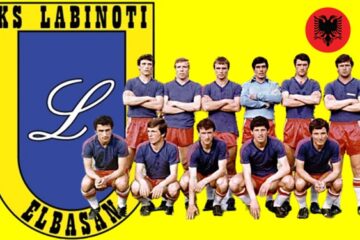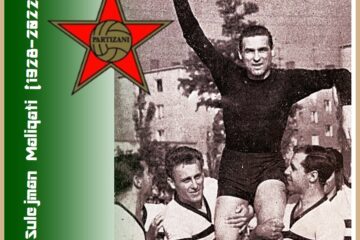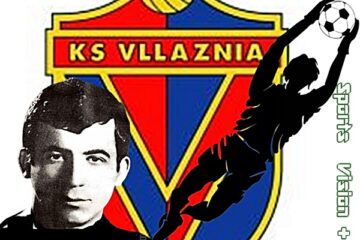“Exploded” in Kuçove! | Naftëtari – Dinamo, the decisive match that marked the end of an era.
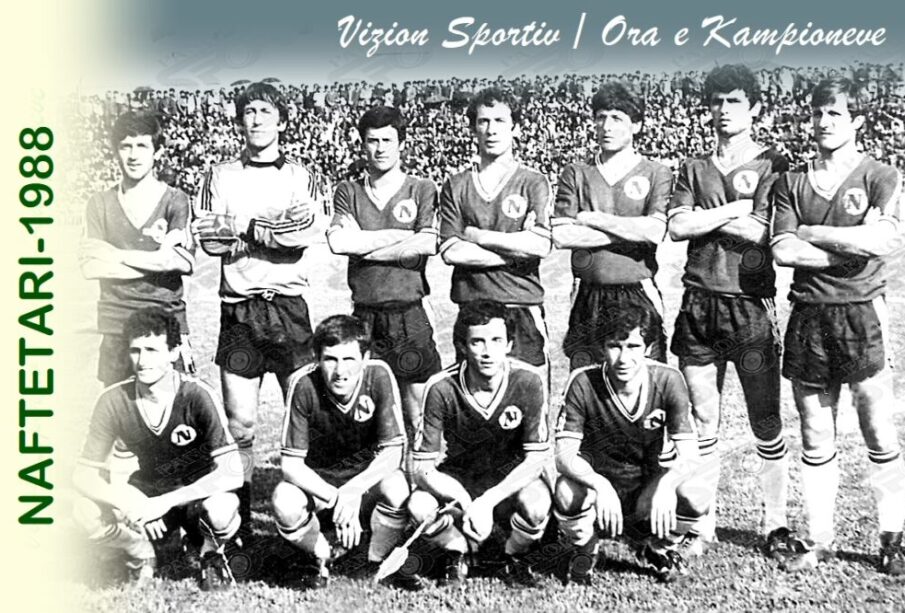
EVENTS FROM FOOTBALL, WITHOUT SIMILARITY ONE TO ANOTHER!
A joke from the movie “General Gramophone” would say, “Exploded in Kucove”!
10 years later from the release of that film, the joke will take on the proportions of a real event created precisely from a football match.
This is the Rubric: Events from football, different stories with no similarities to each other!
I
Atmosphere in the pre match of survival!
It will be June 5, 1988 in the former Stalin City, in a match to “survive” in the 1st category, a decisive match that will mark the end of an era, the end of a decade, the best football era in Albania, that of the 80’s.
Definitely! During that decade, there was a National Championship with a lot of competition, rivalry, but also quality, although in the international arena, the representatives or the Clubs they were not having positive results. During that 10-year era, the quality players were seen in almost every team, quality teams were seen, coming out of the group of 4 who were almost contenders and winners of the championship title.
Beyond Partizan, Dinamo, Vllaznia and 17 Nentori, the group of contenders for the title expanded with Labinoti, Flamurtari, Besa, Luftetari and Lokomotiva. Always not forgetting the teams that were a bit behind, but their fields were too difficult to pass, such as Apolonia of Fier, Beselidhja of Lezhe, Skenderbeu of Korce, Tomorri of Berat or even Traktori and Naftetari.
Exactly, Naftetari, the team which in that season (1987-1988) came from the second category and was preparing to play a supplementary match against……
…….unbelievable, the almighty Dinamo!!!
No, it is not a typo, it was precisely this team that only the name Dinamo reminded of the size of this team until then, a worthy representative of Albanian football. Unthinkable!! Until that hot June day in 1988, 14 times the Albanian champion, 11 times the winner of the “Republic Cup”, the great Dinamo had fallen so low, to discuss its presence, its participation in the first category?

That`s the truth, as true as the “Exploded in Kucove” movie joke would become reality, it would turn into a revolt in Kucove immediately after the match. An unimaginable revolt for that time. Was it a spark against the government system or against the injustice that was being done to Naftetari?
Dear reader, it must be clarified that our writing is separate and detached from any political color or nuance, treated only from the sports point of view, however without ignoring the testimonies of those present and the source of the Italian journalist Giovanni Armillota. It should be pointed out that it was not a match at all, but a match that unwittingly will be remembered not only as part of our football history but also as the end of an era.
Naftetari, the team that represented a town like Kucova, which was named after Stalin, “Stalin City” , was relegated to the second category in the 1986/1987 season. At the end of the 1987/1988 season of the second category, Naftetari’s team came second and, based on the regulations, the “Play Off” matches had to be played. Naftetari has to face Traktori in the “Dinamo” stadium in Tirana, which it loses 0-3, and as a loser, it will face a supplementary match with the team that was ranked fourth from the bottom of the classification table
on the 1-st main league.
And this team was Dinamo!!! The team that represented the Ministry of the Interior and the State Police. That season, the boys who “left in their hands” to represent this great and heavy name of Albanian football, were too weak. Well, more or less the names of these playerts were the popular ones that had set the tone for the championships, like Abazi, Bozhiqi, Kove, Stafa, Vata, Briza, Ferko, Ibro, Noga, Jance, Vila, Zenuni, Canaj up to the virtuoso Sulejman Demollari.

(Top left) IBRO, VATA, DEMOLLARI, BOZHIQI, ALKU, TAHIRI, BRIZA, ABAZI (Second row from the left) BOROVINA (massager), STAFA, CANAJ, LUARASI (as. trainer), BIRCE (trainer), ZERI ( vice trainer), FERKO, KOVE, MECE (bottom left) MILORI, JANCE, DAJA, NOGA, XHAFA, GJERGJI, SILLO.
II
What happened to these boys then? The results would be very upset for a team like Dinamo, which in
26 matches played in the championship would end the season in 11th place with 25 points.
7 wins, 11 draws and 8 losses, scoring 33 goals and conceding 32 (+1), which had never happened in the glorious history of this team.
Dinamo had managed to left behind that season only teams like Tomorri of Berat and 31 Korriku of Burrel who had fallen directly to the second category, while the blue jerseys now had to face “for life or death” with Naftetari who wanted to return to the Albanian Major League, in the 1-st Category.
Well, Dinamo in the 1987/1988 season, would not start that bad.
It would start on August 30, 1987 with a 1-1 draw in Korce. Meanwhile, in the second week played on Saturday, September 5, they would score a total of 4 goals against Beselidhja (4-0). This victory would put the team in second place behind Vllaznia, who was leading with full points.
On September 12, in the third week, Dinamo will lose 2-1 in Durres against Lokomotiva, while Tomorri of Berat, after a 3-2 victory over Vllaznis, becomes the leader of the championship!!!
Dinamo loses again, this time in Tirana against Vllaznia 1-3.
In the 5th week, in Berat they get a 0-0 draw. And then in the following weeks, loses to Partizan 3-1, draws with Flamurtari in Tirana 2-2; wins in Burrel 4-0; beat Luftetari 1-0 in Tirana, but lost 1-0 in Kavaje against Besa a week later; In the 11th week, on November 22, 1987, Dinamo lost in Tirana against Apollonia 1-3; They win in Elbasan 2-1 and ends the first phase with a 0-0 draw against its rival “17 Nentori”, on December 6, 1987.
On December 12, it starts the second phase with another draw against Skanderbeg in Tirana (1-1 ) ; a week later, again a draw in Lezhe (0-0); however, the team returns to the victory it was missed after the 9th week, beating in Tirana, Lokomotiva, 1-0 on December 27, 1987.
After an almost 1-month break of the championship, on January 27, 1988, Dinamo travels to Shkoder where they receives a draw against Vllaznia (1-1); now in the 18th week in Tirana they beat Tomorri 4-3 in a match full of emotions and goals. It seems that now after two wins and a draw, the Dinamo team it`s starting to climb, moving away from “the hot zone” of the standings.
It is February 7, 1988. In the 19th week, the historic match between Dinamo and Partizani ends 4-3 for the Blues. Another match for strong hearts and emotions until the end. Well, the ascent has begun and this is proven a week later when the team reaches a 0-0 draw in Vlora against a strong Flamurtari this season. Next, they win in Tirana against 31 Korriku, 2-0. But right after they get a heavy loss in Gjirokaster 3-0 against Luftetari on February 28, 1988 in the 22nd week, proving that Dinamo has no stability.
However, Dinamo had not lost for a while, since the 12th week in Elbasan (1-2). But…..another loss a week later against Besa in Tirana (0-1). Draws in Fier against Apollonia 1-1 proving that it is an unpredictable team, with ups and downs, and without balance;
On March 20, 1988, in the 25th week in Tirana, it did not go further than 1-1 against Labinoti.
The championship ends with another identical draw against the rivals 17 Nentori (1-1). But the team is now ranked 12th, which means that it has to play additional matches to survive in the first category.
III
The Article of Armillota
And here comes the date of June 2, 1988, which is set for the first match of survival, Dinamo – Naftetari.
The first match played in the “Dinamo” stadium will end 1-0 for Dinamo. After the victory, however, it would be talked about as if they were helped by the referees.
In the return match, an article in a newspaper “Rilindja”, the daily of Rome, written by the Italian journalist Giovanni Armillota, among other things he would say:
“Dinamo was escorted to the city of Stalin by a military truck of the police and intervention forces soon”……
We are in 1988. In Albania, the socialist system and the theses of communism are still in power. The dictatorship of the proletariat, and the iron hand continued to dictate Albanian life, although somewhat “softened” after the death of the leader Enver Hoxha, even though it was in its last days, it was felt again.
Here the question arises: “Why, Dinamo was accompanied by the police force and the quick intervention troups?” It had never been heard before, and it had never happened that the country’s sports teams traveled inside the Albanian territory, “armed” for protection in case of any attack and aggression…
What aggression? Against whom? Then why was Dinamo accompanied like that? Did it feel behind the scenes that something violent would happen? Even if it were so, the government system would never allow such events to happen, as it had never happened before in Albanian stadiums.
In fact, the economic situation in Stalin City, and in other Albanian cities, had begun to settle down. From this detail, the journalist Armillotta in his writing makes aware of a connection between football and politics and the situation in Albania.
Armillotta will write: “The referee made a one-sided direction, specific to Dinamo’s match. The football players immediately protested and then, in a fragmentary way, the public. The police forces were dispersed in the dressing rooms to protect the football players of Dinamo (!!!). The news got out of the stadium and there were fights in the streets. The citizens of Stalin City (not only the fans of Naftëtari), under the pretext of opposing the direction of the match, for the first time in the history of communist Albania, staged a large protest against the regime in Tirana (!!!) They went so far as to set it on fire a police car. Meanwhile, law enforcement protested and took Dinamo’s players and the trio of referees to their defense. At the same time, Stalin City agents made many arrests, which led to trials the next day, and even the mayor had problems”.
Armillotta continues: “The Albanian Football Federation agreed with the Central Committee of the Labor Party and disqualified Naftëtari, as responsible for the 1988-89 season, allowing the team to resume from the second category in 1989-90. The city of Stalin, the center of oil extraction and other small towns of Albania, were left in a state of total poverty, while Tirana, Durrës, Elbasan, Shkodra, Vlora, etc., were treated the best (!!!)
Therefore , the Party knew it was faced with a dilemma: either leave Dinamo to its fate, accepting its own incompetence, or perhaps a victory for Naftëtari would present the reward of those of some worth. The government chose the second, while in the first case the promotion of Naftëtari, unlike many Albanian issues, could not be hidden from the citizens”
At the end of Armilotta’s “seal” like this: “The incidents were certainly not the result of a network, or of a match refereed one-sidedly, but the expression of a bad, general state that was spread throughout the country” .
Always according to Armilotta: “The Ministry of the Interior, among other things, made a mistake in the distribution of special forces. In fact, they had not been carefully distributed before the match, so the citizens expected in advance an intervention of the army. A police car was placed between Lushnja and Berat, another between Fier and Berat, also another pickup truck, with 30 people, was placed at “Ura Vajgurore”, 3 kilometers from Stalin City, and the intersection between the 3 aforementioned cities.” – concludes the Italian journalist.
* * *
But what really happened in Kuçova? Was football used for politics? How was the situation before the match and what happened inside and outside the field?
However, as we quoted above, we will treat the event that happened at a distance from the political situation of that time, naturally respecting the protest of the local fans and their dissatisfaction that took a different direction, crossing the imaginary line that separates sport from violence and politics where the latter, without any color or nuance, has known how to heat up blood, to take advantage of such events often, using the situation in their own favor. Always, if that protest was staged before it turned into a massive popular revolt against the dire economic situation.
IV.
The big challenge!
Let’s go back to the match that took place at the Kucove sports field on June 5, 1988. The interest is extraordinary. The few steps of this football plant, are full and full in support of their team, Naftetari.
Time 17:00!
Both formations go down to the field with these compositions.
Naftetari players: Ylli Vrusho, Astrit Haxhia, Dashnor Dume, Roland Makashi, Mihallaq Bonjaku, Sokol Meta, Gëzim Gega, Bam Fraholli, Edmond Voda, Aleksandër Koçi and Agim Meta
Dinamo : Ilir Bozhiqi, Edmond Kela, Stafa, Kove, Pjerin Noga, Rudi Vata, Agim Canaj, Ndreu, Ibro, Sul Demollari, Jançe, Topçiu, Ermal Tahiri, Eduart Abazi.
Referee: Besnik Kaimi with the two sides Hajro Leskaj and Fatmir Damo.
It is normal to point out that at that time the FSHF (Federation of Albanian Football) appointed the referees for the matches of the week as well as every other championship or cup match.
Therefore, the best referee of the time, the referee of the international category, Arsen Hoxha, was appointed by the FSHF to conduct this “survive match”.
Surprisingly later, everything changed. The trio of referees for this very important meeting was appointed by the Ministry of the Interior, which, after calling the chief B. Kaimi to the office, had communicated to the latter to influence Dinamo’s victory at all costs. What was said, and what was decided that day in the Ministry’s office, will probably never be known, but later, after that event, Mr. Kaimi will prove that he did not agree to favor Dinamo, but if the regular 90 minutes would end 1-0 for Naftëtari, he would take the match to penalties.
He continues to testify that: “To be honest, I would do this because I wanted to save my head.”
“However, this did not happen, as Dinamo scored and everything was closed. To save from falling one category below, Naftetari needed to score three more goals, as the first match had ended 1-0 for Dinamo.” “I closed the game without giving the extra time…”
* * *
The situation was pregnant throughout the week, where people talked about possible favoritism of Dinamo and their behavior if this happened. It should be noted that until that day, Kucova fans had applauded many referees for fair direction of the games played even when Naftetari lost, thus aligning themselves at the level of Shkodra fans or any other city.
But on June 5…
The match started strong and fast with a beautiful first half. Naftetari plays fast and pushes forward. They insist, creates numerous scoring opportunities, but fails to finalize them. Dinamo defends well, organized, with tactical discipline, and the decisive interventions of the goalkeeper Bozhiqi stand out above all, precisely the boy who, ironically, is from Kucova, who comes from Naftetari’s school.
Here is an ideal occasion for marking, but everyone is surprised how “a race striker” and goal scorer like Aleksander Koci misses it. Again, the nets intact, 0-0, a result that closes the first 45 minutes of a sports battle characterized by emotions and strong heartbeats.
There is no tension, there is no spark or sign of a revolt. The same picture continues in the second part. Sporting war, with a Naftetari who attacks and attacks but who runs into the impenetrable wall of Dinamo. Even the situation appears to be normal, although the referee Kaimi will be fined several times for fouls which do not convince the players of Naftetari nor the public who start to doubt these interventions to reduce the momentum and pace of their team.

It’s the 65th minute. Back in the game for Dinamos, comes midfielder Tahiri who throws the ball to Vila, who entered the game replacing Topciu.
Located at a distance of 40 meters, Vila does not think twice but launches a real projectile.
The ball, as if by remote control, goes into the right triangle of goalkeeper Vrusho, causing a general silence of the audience.
Goal!
A great goal was scored, the fatal goal for the locals who have now lost their hopes. Now the local players have to score three goals against this Dinamo, a bunker in defense and a killer in the counterattack. How can this be achieved when Naftetari was not able to score even once until then in the 65th minute?
From the moment the goal is conceded, the game becomes aggressive. The locals are not happy with the result, they had dominated the game until that moment….
This is not fair!!!
The public also insults in chorus by throwing stones and hard objects on the field. One of these items unfortunately hits a Naftetari player. From minute to minute, the irritation is increasing. The tension reaches its peak when the referee Kaimi whistles the end of the challenge just before time!
Why?
The referee himself will say that: “To avoid incidents, it was not worth respecting the extra minutes”!!!
The crowd is now very angry, screaming with all its might. It seems like the situation is going to get out of control. The police intervene and escort both teams to the locker room. The other part is not football, but based on the evidence, it concerns an event that was used by this sport in favor of politics.
Well, all over the world, sport should build bridges of unity in every society.
From many evidences, it is said that Dinamo stays closed there until 12 o’clock at night. Then, the police force, who had come from Tirana, escorted the team back to the “IFA” pickup truck of the time, after the windows of its bus were broken and damaged by taking it out of use…
wait a minute: A little above, we quoted the Italian journalist Armilotta, who had written that Dinamo on the way to Kucove, before the match, was accompanied by many police forces….(!!!).
There are many details that do not correspond to each other, anomalies and folklore colors.
However, let’s continue: There are two or three dead people, including a child!!!
Fights with law enforcement…… but later it turned out they weren’t real!!!
Some of the witnesses took on folklore colors, but of course the situation in the stadium and outside on the street was very bad, not for nothing that Dinamo left Kucova in the late hours of the night. It was also said that numerous police forces had arrived from Berat, Lushja and Fieri to control the situation that had apparently gotten out of control.
Maybe!
Yes, it is a fact that there were fights and arrests later. Injured people together with law enforcement, streets full of thrown stones, broken shop windows, a burnt police car. All the signs of a widespread revolt, but there were no dead.
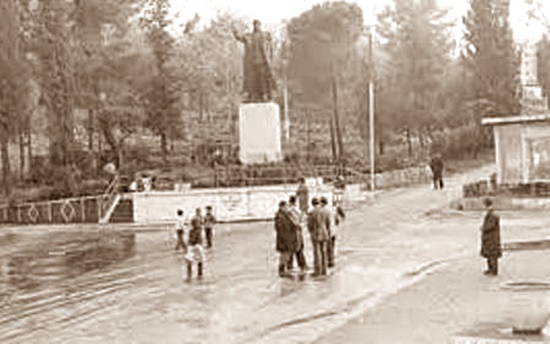
Pictures from the Stalin City of the time
V.
Besnik Duli’s testimony.
Duli was one of the basic players of the Naftetari team, but in the match against Dinamo, he was punished with a red card in the preliminary challenge against Traktori (lost 0-3). And exactly Duli will testify about the Kucove event:
“For the importance of this challenge, the refereeing was planned by the best trio at that time, Arsen Hoxha, Plarent Kotherja and Dhori Prifti. But surprisingly, everything changed when all the locals saw the referee Kaimi on the day of the match.
Ironically, Mr. Besnik was a former Naftetari player years ago. Maybe someone was happy about this re-appointment of the referee, but in fact it will not turn out like this”.
Kucovar football player Duli will continue his testimony like this:
“Besnik had forgotten the “bread he had eaten” and what’s more, he behaved during the match as Dinamo’s twelfth player. Dinamo came with ” Sampists – special forces”, like they are going to war. The forces of order, reinforced by arrivals from Berat, Fieri and Lushnja, were the assurance that everything would go smoothly. But the calculations were made without the inn, the Kucovars had shown themselves in the face of injustice as early as ’36. The situation was pregnant throughout the week, where people were talking about possible favors of Dinamo and their behavior if this happened”.
“I didn’t play that match. I was suspended for three games after receiving the red card in the final match with Traktori. I protested strongly for a penalty denied by referee Plarent Kotherja in our favor when the score was 1-0 for Traktori. I didn’t play, but I watched the match, which was allowed at the time. I was standing behind the goal of Dinamo, who was being defended by our former goalkeeper, Ilir Bozhiqi, we were angry with each other. I was teasing Iliri who was playing the hero in that match, three or four flagrant goals saved by him”
“The first half of the match ended with a 0-0 draw. In the second half, Naftetari even increased they pressure. This is where “Party`s Besnik”, the kamikaze referee Besnik Kaimi came into play.
He slowed down Naftëtari with frequent fouls, both quiet and peaceful. In this way, Dinamo was able to breathe and, with increased care, control the Naftetari frenzy. Minutes passed and the match was going exactly as Besnik and his friends had predicted. It is at these moments that the fans react and the tension rises. The police pass from the perimeter of the field to the steps of the stadium, among the fans. The match was interrupted two or three times and at one point the news broke that a fan had been injured”
“And that’s how it was. The injured fan was taken by the hands and walked along the stadium. Such a sight increased the tension even more. A few minutes before the end of the match, Vila of Dinamo, newly introduced in the game, scores a Eurogoal from distance. Here everything ended and died for Naftetari”
“Judge Kaimi, seeing that the situation was getting out of hand from moment to moment, ended the match 5 minutes before. “The Sambistas” took him under protection and quickly directed him to the dressing room. Meanwhile, the fans enter the field and become its masters. As the players and referees entered the dressing rooms, the situation outside was in the hands of the population. The result no longer mattered, the “war” was fought for dignity and justice. The bloodied face of the wounded man was an incentive for more violence.
The building of the “Naftëtari” team was surrounded for hours by irritated fans”.
Duli describes the situation inside the dressing rooms as follows:
“I remember being next to Agim Canaj, Topçiu, Rudi Vata. Inside the rooms there were many fear, we heard that the fans were going to set fire to the building. Anxiety and irritation had taken over all of us. Especially I was getting married in a week…
I had prepared for the party, I even had the invitations with me . Many thoughts were going through my head. At around 11 o’clock we left the building, when we saw it… the streets were full of stones, cars with broken and overturned windows.”
Mr. Duli concludes what he witnessed that day.
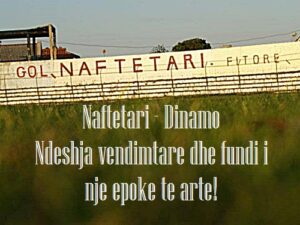
* * *
At midnight, the police arrested 120 people and escorted them to the Department of Internal Affairs in Berat. 16 people were detained, 9 in prison and 7 to be tried in a free state.
On June 9, the trial took place in the city’s cinema where the sentences were given for each. Among them was the former chairman of the Executive Committee at that time Secretary of the Party, Naun Halilaj, is destroyed, not to be resurrected even today.
Thus, the well-known Fatmir Ismaili is sentenced to six months of correctional work in the Brick Factory Angjeli, the right to train in all categories is removed. Football players Roland Makashi and Sokol Meta are permanently excluded from all sports activities.
Aleksander Koçi, Besnik Duli, Fatmir Xhyberi, Kaço Haxhiaj leave football.
The rest of Naftetari’s players leave to play in other teams. Ben Iljazi and Barjam Fraholli join “Ylli i Kuq – The Red Star” in Pogradec, while Gëzim Gega, Mihallaq Boshnjaku, Edmond Voda and Ylli Vrusho move to Tomorri.
Likewise, Nole Dume and Artan pass through Tomorri. Kocani, Sokol Meta and Vasillaq Masari.
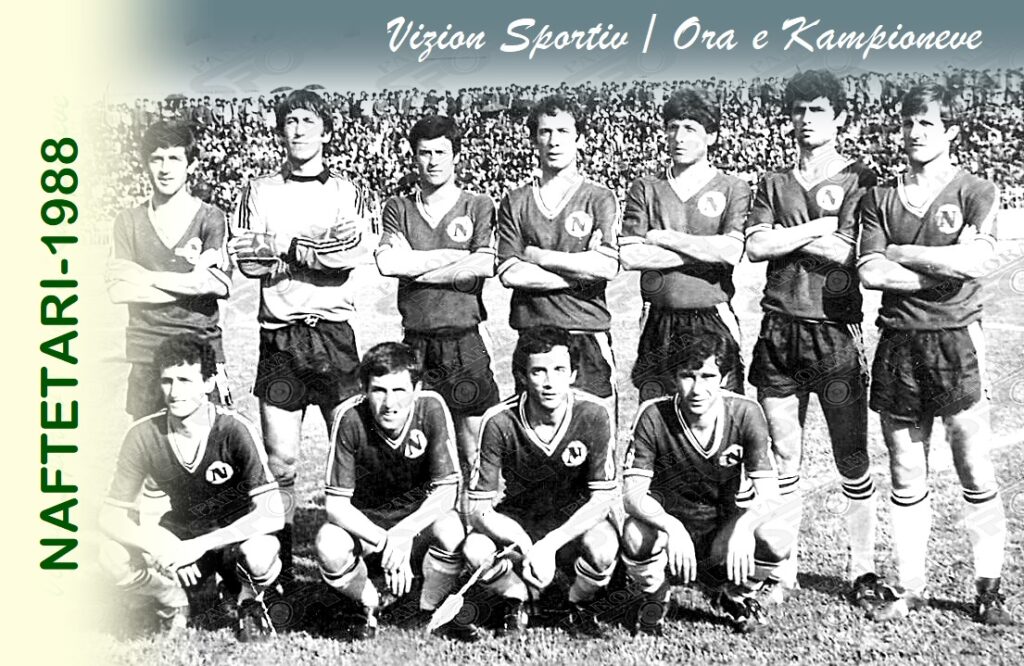
This will make 15 players removed.
Here’s what the former chairman of the Executive Committee in the former Stalin District and former director of the Oil Extraction Company, Daut Nonaj, will say about June 5:
“From 1972, when I was appointed Chairman of the Executive Committee of Kuçova and until now day that is being talked about, I have never been separated from the contribution to the Naftëtari team, first in the above position and then as the Chairman of the Football Commission, to end it on the day of the occurrence of the unexpected in June 1988 as the team commissioner of happened on the reserve bench of “Naftëtari”.
A scene that had never been seen in Albania in those years. The state had risen against the revolters who had the right to be angry. That event, in my opinion, was a signal of the open war against the injustices of the system, which had begun to degrade, and I have never agreed that the revolt against injustices was only carried out by Kavaja almost two years later”.
(C) Copyright By Pjerin Bj | Exclusive on this page it bears the date July 5, 2024
_________________________
Sports Vision / The Hour of Champions
Material used: Personal collection of the newspaper “Sporti Popullor” / Giovanni Armillotta / Testimony of referee Besnik Kaimi and former footballer of Naftetari, Besnik Duli.
Discover more from Sports Vision +
Subscribe to get the latest posts sent to your email.


